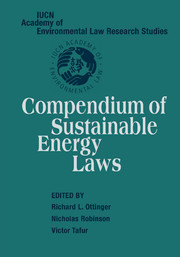Book contents
- Frontmatter
- Contents
- Acknowledgments
- Introduction
- I WORLD ENERGY ASSESSMENT
- II INTERNATIONAL AGREEMENTS
- III INTERNATIONAL LAW DECLARATIONS AND OTHER SOFT LAW INSTRUMENTS
- Universal Declaration of Human Rights
- Millennium Declaration
- Stockholm Declaration of the United Nations Conference on the Human Environment
- Declaration on the Right to Development
- World Charter for Nature
- Rio Declaration on Environment and Development
- The Earth Charter (As endorsed by UNESCO and IUCN)
- IV ACTION PLANS AND MULTILATERAL OPERATION RECOMMENDATIONS
- V SELECT REGIONAL INTERNATIONAL ENERGY AGREEMENTS
- VI SELECT NATIONAL LEGISLATION ILLUSTRATIVE OF SUSTAINABLE ENERGY LAW INNOVATIONS
- Index
World Charter for Nature
Published online by Cambridge University Press: 03 May 2010
- Frontmatter
- Contents
- Acknowledgments
- Introduction
- I WORLD ENERGY ASSESSMENT
- II INTERNATIONAL AGREEMENTS
- III INTERNATIONAL LAW DECLARATIONS AND OTHER SOFT LAW INSTRUMENTS
- Universal Declaration of Human Rights
- Millennium Declaration
- Stockholm Declaration of the United Nations Conference on the Human Environment
- Declaration on the Right to Development
- World Charter for Nature
- Rio Declaration on Environment and Development
- The Earth Charter (As endorsed by UNESCO and IUCN)
- IV ACTION PLANS AND MULTILATERAL OPERATION RECOMMENDATIONS
- V SELECT REGIONAL INTERNATIONAL ENERGY AGREEMENTS
- VI SELECT NATIONAL LEGISLATION ILLUSTRATIVE OF SUSTAINABLE ENERGY LAW INNOVATIONS
- Index
Summary
The General Assembly,
Reaffirming the fundamental purposes of the United Nations, in particular the maintenance of international peace and security, the development of friendly relations among nations and the achievement of international cooperation in solving international problems of an economic, social, cultural, technical, intellectual or humanitarian character,
Aware that:
(a) Mankind is a part of nature and life depends on the uninterrupted functioning of natural systems which ensure the supply of energy and nutrients,
(b) Civilization is rooted in nature, which has shaped human culture and influenced all artistic and scientific achievements, and living in harmony with nature gives man the best opportunities for the development of his creativity, and for rest and recreation,
Convinced that:
(a) Every form of life is unique, warranting respect regardless of its worth to man, and, to accord other organisms such recognition, man must be guided by a moral code of action,
(b) Man can alter nature and exhaust natural resources by his action or its consequences and, therefore, must fully recognize the urgency of maintaining the stability and quality of nature and of conserving natural resources,
Persuaded that:
(a) Lasting benefits from nature depend upon the maintenance of essential ecological processes and life support systems, and upon the diversity of life forms, which are jeopardized through excessive exploitation and habitat destruction by man,
(b) The degradation of natural systems owing to excessive consumption and misuse of natural resources, as well as to failure to establish an appropriate economic order among peoples and among States, leads to the breakdown of the economic, social and political framework of civilization,
[…]
- Type
- Chapter
- Information
- Compendium of Sustainable Energy Laws , pp. 99 - 101Publisher: Cambridge University PressPrint publication year: 2005

